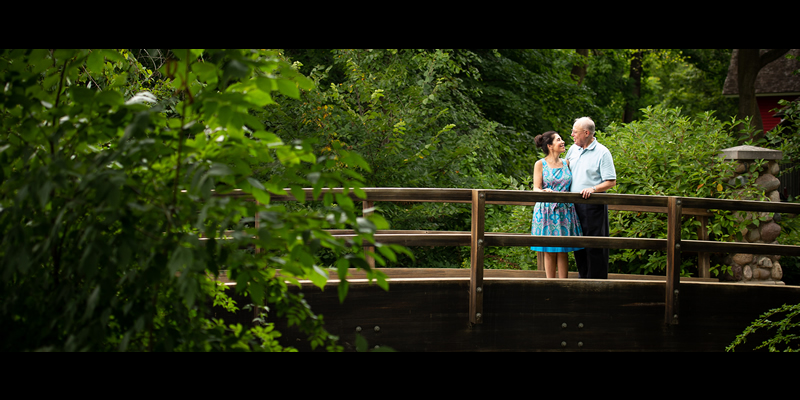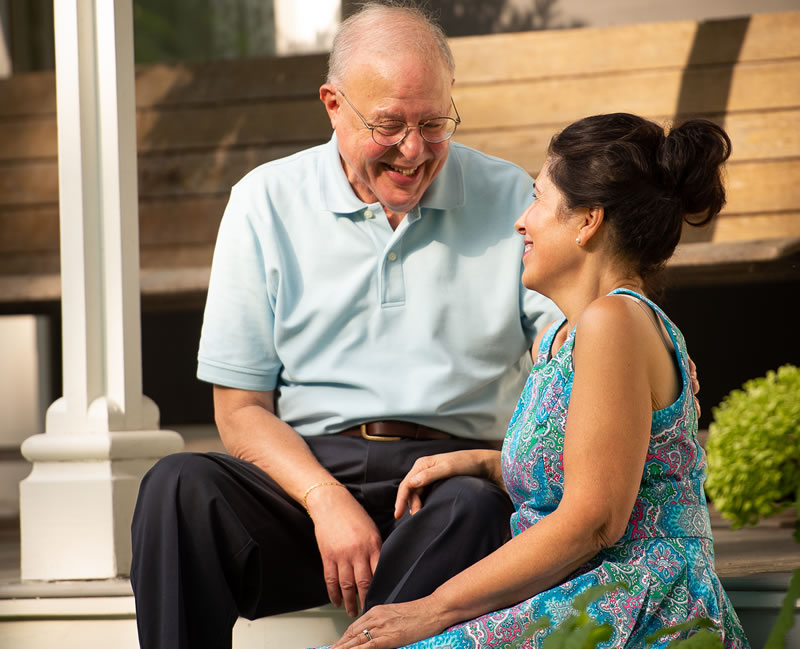Trying Treatment

photo credit: Edda Pacifico
One head and neck cancer patient turned to social work when faced with a complicated surgery and taxing treatment plan
Harry Robins, now 71, got the shock of his life in July 2014 when he learned about the surgery he needed to treat the squamous cell tongue cancer that showed signs of spreading. The surgery was way more invasive than he expected, involved removing a third of his tongue and required months of intensive rehabilitation to recover.
He and his wife, Robyn Palmer, were stunned and upset. The cancer diagnosis was difficult enough, but now Robins faced the surgery. The medical information and details about pre-surgery and post-surgery treatment protocol were very complicated. That was when Chris Henrickson, LMSW, came in to help.
Henrickson, a clinical social worker at the Rogel Cancer Center, counsels head and neck cancer patients during times of crisis and focuses on finding solutions.
“He was in shell shock,” Henrickson says. “People are always hoping against hope it’s not cancer, and to learn it would require such an invasive surgery was devastating.”
Robins, who spent his career traveling the United States doing marketing and sales for the automotive industry, admits he was slow to trust his care team. Henrickson recognized the need to explain the normal feelings and reactions that go along with the stress of cancer. Teaching patients how to begin communicating their emotions can be a first step in coping.
“Chris showed up, took my wife and I aside and began to do her magic,” Robins says. “It’s not just that she’s a social worker. She’s a remarkable human being who got through to a hard-headed salesman at the time.”
Robins’ surgery took place the next month and lasted most of the day. In addition to removing part of his tongue, Kelly Malloy, M.D., associate professor of otolaryngology, rebuilt his tongue using tissue and veins from other parts of his body.
Henrickson helped the family prepare ahead of surgery for the care needed during Robins’ recovery period. She also arranged to have support available for Palmer in the waiting room during the long wait.

photo credit: Edda Pacifico
“Somehow Chris Henrickson found the time in her demanding daily schedule to show up at key times, like during appointments with my head and neck surgeon, during my lengthy operation to comfort my wife, and phone conversations to arrange contacts with the key medical support professionals I needed during my months of acute care after surgery,” Robins says.
He was unable to speak after his operation and relied on a whiteboard and marker to communicate. He spent 2.5 months in a rehabilitation facility where he relearned how to speak, swallow, drink and eat.
Complications led to another surgery in December 2014 for a cancer recurrence that extended to the lymph nodes on the other side of his neck. He required a combined treatment protocol of radiation and chemotherapy.
Robins completed treatment for his head and neck cancer in March 2015. He no longer takes his health for granted and speaks highly of the many experts and extended medical staff at the Rogel Cancer Center who contributed to his treatment and recovery. His health is good. Even now, over three years later, Robins communicates via email with Henrickson on his progress.
“Chris is remarkable in her personal demeanor and has exceptional follow up and follow through. She has a vast understanding of how to navigate the many avenues my case required to find daylight at the end of a very long trail,” Robins says.
From her perspective, Henrickson sees Robins as a head and neck cancer success story and attributes much of his success to his determination to understand and get to know his network of caregivers. He also made use of the resources available at the Rogel Cancer Center, including nutritional counseling from registered dietitians, guided imagery, speech therapy and social work.
“Patients can be skeptical of support, but once Mr. Robins realized I understood how he was feeling, he began to trust me,” Henrickson says. “A patient’s willingness to learn they can do better with support often speaks to their success.”
It takes a health care team
Robins says kudos and thank you to his entire extended care team, including:
- His surgeon, Kelly Malloy, M.D., and surgical team
- Speech language pathologist, Teresa Lyden, M.A., CCC-SLP
- Chris Henrickson, LMSW
- Registered dietitians
- Numerous registered nurses and physician assistants
- Physical therapists
- The Radiation Oncology team
- The Head and Neck Oncology team who oversaw his chemotherapy treatments and personal health care
- Members of the PsychOncology Clinic
- …and more.
Continue reading the Fall, 2018 issue of Thrive
